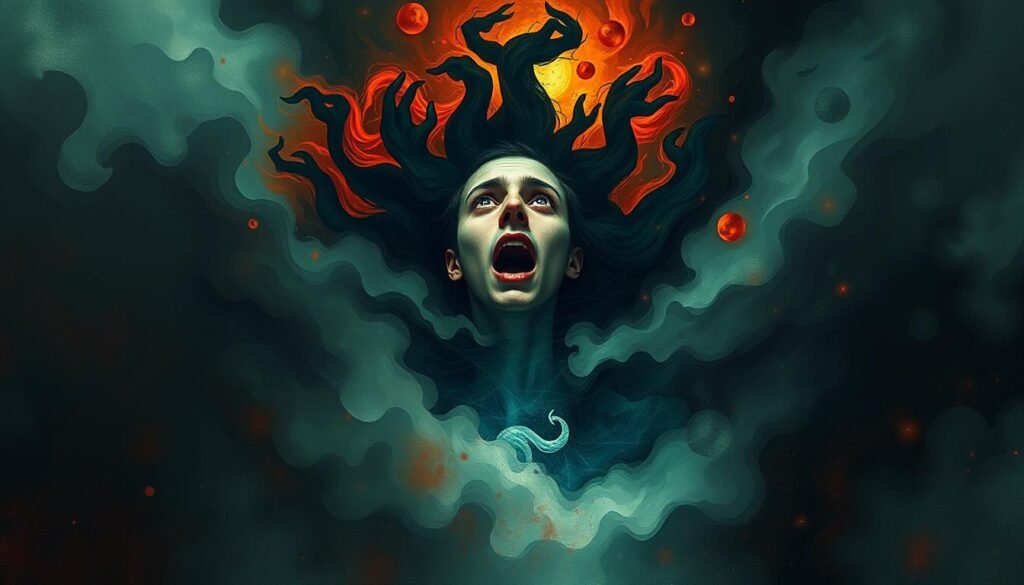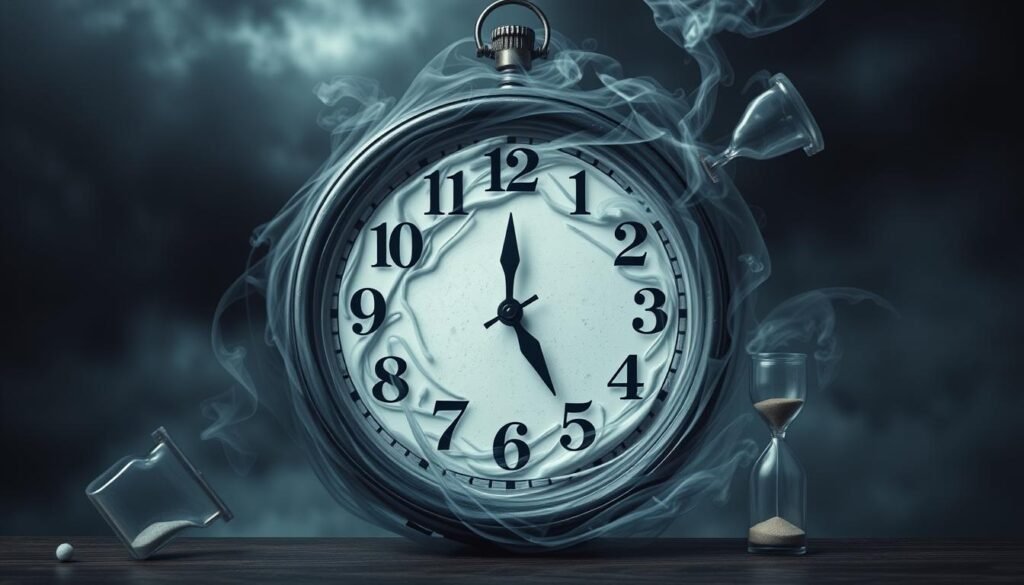About 31.1% of U.S. adults will face an anxiety disorder at some point. This fact is crucial for grasping the complexity of anxiety attacks. Since ‘anxiety attack’ is not a medically defined term, episodes can vary greatly. Knowing what to expect can aid in finding better ways to handle them.
Anxiety symptoms can last a long time and affect daily activities. Unlike panic attacks that last 5 to 30 minutes, anxiety can go on for hours or even weeks. It’s vital to understand these differences to cope better. Learning about anxiety attacks is the first step towards emotional well-being.
Key Takeaways
- 31.1% of U.S. adults experience anxiety disorders in their lifetime.
- Anxiety attacks lack a formal definition but can have varying durations.
- Panic attacks generally last 5 to 30 minutes, with symptoms peaking early.
- Symptoms of anxiety may persist for hours, days, or weeks.
- Understanding anxiety attack durations is crucial for effective management.
Understanding Anxiety Attacks
Anxiety attacks are common and can be described in different ways. The term isn’t officially used in medicine. People might say they’re having an anxiety attack when they feel extremely anxious. This can happen without any obvious reason. Knowing what an anxiety attack is can help manage intense emotions.
Defining Anxiety Attacks
Anxiety attacks are seen as sudden spikes in anxiety. They can last a few minutes or stretch over days. Anxiety is normal, but these intense moments are different. They happen without any clear reason, setting them apart from usual anxiety.
The Difference Between Anxiety Attacks and Panic Attacks
It’s important to know how anxiety and panic attacks differ. Panic attacks come on fast and are intensely scary. They happen suddenly, making people feel terrified. Anxiety attacks build slowly and feelings last longer. This shows how complex anxiety disorders can be and how they affect lives.
Symptoms of Anxiety Attacks
It’s important to know what anxiety attack symptoms look like. They come in physical and emotional forms. Knowing the signs helps you deal with them better.
Physical Symptoms
Physical symptoms can start out of nowhere and seem scary. They include:
- Rapid heart rate
- Sweating
- Shortness of breath
- Dizziness
- Nausea
These can make you think you have a serious health problem. But learning about them shows they’re just how your body reacts to fear.
Emotional and Mental Symptoms
Feelings play a big part in anxiety attacks too. You might feel:
- A sense of dread or impending doom
- Irritability and agitation
- Cognitive distortions, including worrying too much
- A loss of control or feeling detached from reality
These feelings can be as overwhelming as the physical ones. Understanding both sides of anxiety is key to handling it.

| Type | Symptoms |
|---|---|
| Physical Symptoms | Rapid heart rate, sweating, shortness of breath, dizziness, nausea |
| Emotional Symptoms | Sense of dread, irritability, cognitive distortions, loss of control |
Frequency and Duration of Anxiety Attacks
Understanding the frequency of anxiety attacks is key for those affected. Anxiety attacks vary from person to person in how often they happen and how long they span. Some might have them only now and then. Others might get them more often, especially if they have anxiety disorders.
How Often Do Anxiety Attacks Occur?
The frequency of anxiety attacks can vary a lot. This is because of factors like personal situations and mental health. Some people might have attacks just once in a while. Yet, for others, the attacks might occur several times within a week. Sometimes, people might go through frequent symptoms and then enjoy a break, showing how unpredictable anxiety can be.
Duration of Panic Attacks vs. Anxiety Attacks
Panic attacks often last between 5 to 30 minutes. They usually peak around 10 minutes after starting. Most of the time, panic attacks go away within about 30 minutes.
On the other side, how long do anxiety attacks last can greatly change. These attacks may go on for a few moments up to several days. While they tend to peak at around 10 minutes, the aftermath can impact a person well beyond the attack.

How Long Do Anxiety Attacks Last
Knowing how long anxiety attacks last can offer comfort. They are different from panic attacks, which last a few minutes to half an hour. Anxiety attacks build up slowly and affect everyone differently. Many people ask, how long do anxiety attacks last? Typically, they go on from a few minutes to half an hour, but they tend to peak in five minutes or less.
Typical Duration of Anxiety Attacks
Time can feel odd during an anxiety attack, stretching a few minutes into what seems like an hour. Some even feel a ten-minute anxiety event as lasting an hour. If anxiety attacks stretch over hours or days, it could mean there’s a condition like generalized anxiety disorder (GAD). Knowing the anxiety attack duration aids in managing the episode. Research shows, two-thirds of people getting treatment for anxiety see improvement in six months.
Factors Influencing Duration
There are factors influencing anxiety that change how long an attack lasts. These are:
- Individual stress levels – More stress means longer attacks.
- Coping mechanisms – Good strategies can cut it short.
- Underlying mental health conditions – Illnesses like GAD lead to long-lasting attacks.
- Environmental triggers – Certain places or situations can make attacks last longer.
Becoming aware of these factors helps people know their triggers and expect possible anxiety moments. For more information, look at articles that tell the difference between anxiety and panic attacks. They give good details on symptoms and how to handle them. Find more at this source.

| Duration Type | Anxiety Attacks | Panic Attacks |
|---|---|---|
| Typical Duration | Minutes to 30 Minutes | Fewer than 30 Minutes |
| Peak Symptoms | Within 5 Minutes | Within 10 Minutes |
| Potential for Prolonged Episodes | Possible (GAD) | Uncommon |
| Recurrence | Multiple Episodes | Single or Repeated Episodes |
What to Expect During an Anxiety Attack
Knowing the phases of anxiety attacks helps us understand what happens. It lets people get ready for what’s coming. Even though everyone’s experience is a bit different, the pattern is usually the same.
Phases of an Anxiety Attack
Anxiety attacks have three main stages:
- Build-up: This phase usually starts with anxiety slowly getting worse. Things like stress or certain places can make you feel uneasy. At first, these signs are easy to miss. But they get stronger over time.
- Peak: During this time, the anxiety hits its highest level. You might feel your heart racing, find it hard to breathe, or feel dizzy. You could also feel really scared or panicked. It feels very intense.
- Reduction: After the peak, things slowly start to get better. How long this takes varies from person to person. Some people use deep breathing or other techniques to feel better during this phase.
Understanding these stages helps people manage their anxiety attacks. It makes it easier to handle the symptoms when they know what’s coming.
Coping with Anxiety Attacks
Dealing with anxiety attacks requires knowing what to do right away and over time. Spotting symptoms early helps you take quick steps to feel better. Building both short-term and long-term plans makes a big difference in handling anxiety.
Immediate Coping Strategies
Quick coping methods can greatly reduce anxiety attack intensity. Deep breathing, grounding, and living in the moment help a lot. Spotting signs early boosts the effectiveness of these techniques. It’s good to try different approaches, like:
- Deep Breathing: Slow, deep breaths help your body calm down.
- Grounding Exercises: Connecting with what’s around you shifts focus from anxious thoughts.
- Mindfulness: Staying focused on now prevents worry.
- Distraction Techniques: Doing something fun takes your mind off anxiety.
Long-term Management Techniques
To maintain progress, long-term methods are important. Therapy, medication, and changing your lifestyle provide a strong base for mental health. Many benefit from mixing these approaches:
| Technique | Description | Benefits |
|---|---|---|
| Cognitive-Behavioral Therapy (CBT) | Aims to change negative thought patterns. | Improves coping mechanisms and reduces anxiety. |
| Medication | Prescribed to manage symptoms more effectively. | Can provide relief and allow for therapy to take place more effectively. |
| Lifestyle Changes | Incorporating physical activity and healthy eating habits. | Enhances overall mental health and resilience against stress. |
| Support System | Building connections with friends and professionals. | Offers emotional support and accountability. |
Matching quick fixes with long-term plans is key to managing anxiety attacks. Talking to a professional helps tailor your own way of handling anxiety. Websites like coping with anxiety attacks provide valuable tips for dealing with these challenges.
Recovery Time After Anxiety Attacks
When you have an anxiety attack, the after-effects are important to understand. People often feel tired, confused, and upset after an attack. These feelings can make everyday activities hard. Recovery time from an anxiety attack can change from person to person. It depends on how severe the attack was and the person’s resilience.
Understanding the Aftermath
Anxiety attacks affect both your body and mind. You might feel:
- Fatigue lasting a few hours to several days
- Muscle soreness and stomach pain
- Problems focusing due to brain fog
- Feelings of anxiety or sadness
Getting better after an anxiety attack means taking good care of yourself. Doing some light exercise can help by releasing endorphins. This can make you feel better. Eating a small snack helps bring back needed nutrients and helps your brain work better.
Studies have shown recovery times can vary based on how severe the panic attack was:
| Severity Level | Estimated Recovery Time |
|---|---|
| Mild | 1 – 12 hours |
| Moderate | 12 – 24 hours |
| Severe | 24 – 72 hours |
Healing emotionally is just as important as physical recovery. Techniques like deep breathing, grounding exercises, and using positive affirmations help. They can give you back control over your life. And help you find the right treatments to manage anxiety attacks.
For more tips on dealing with anxiety attacks, check out this resource.
Seeking Help for Anxiety Disorders
Knowing when to get help is key to dealing with anxiety disorders well. If anxiety attacks happen often or are very strong and mess with daily life, it’s time to look for help. Recognizing the right time to see a doctor is important for recovery and feeling better overall.
When to Consult a Healthcare Professional
Seeing a healthcare professional is crucial if anxiety feels too big to handle or keeps coming back. You should get help if:
- You’ve felt anxious for many weeks.
- Self-help methods aren’t working for you.
- You have things like headaches or stomach problems that don’t have a clear cause.
- Anxiety is making it hard to hang out with people or do your job.
- You find yourself using alcohol or drugs more to deal with anxiety.
Possible Treatments for Anxiety
There are many treatments for anxiety, each one tailored to what you need. Different treatments help in different ways, allowing people to find what works best for them. Some well-known treatments are:
| Type of Treatment | Description |
|---|---|
| Cognitive Behavioral Therapy (CBT) | A program that works on changing negative thoughts and actions. |
| Dialectical Behavior Therapy (DBT) | This therapy mixes one-on-one sessions with group meetings to learn how to handle tough situations. |
| Acceptance and Commitment Therapy (ACT) | Helps you accept your thoughts and feelings and commit to changes in your behavior. |
| Medication | Options include daily medications like SSRIs, SNRIs, and benzodiazepines for quick relief. |
Starting the journey to get help can really make your life better. Getting help early is key to feeling better and taking back control.
Conclusion
Anxiety attack durations vary greatly among individuals due to different triggers and personal situations. Typically, these episodes can last from minutes to hours, or even days. This range shows how complex anxiety can be. Knowing how long attacks might last is key to better management. This knowledge helps reduce the feelings of anxiety and panic when they occur.
It’s important to recognize the symptoms and what causes them. This understanding can make the experience more manageable. Learning coping strategies can help take back control. Additionally, professional help and exploring treatments like medications or therapy can improve well-being.
Understanding anxiety attacks is a powerful step toward better mental health. Knowing about attack durations and how to respond can empower individuals. This empowerment greatly enhances one’s mental health journey.